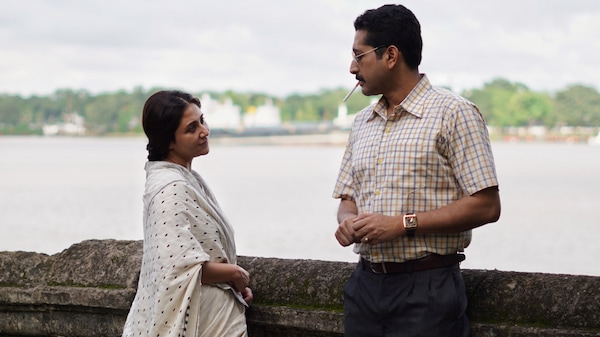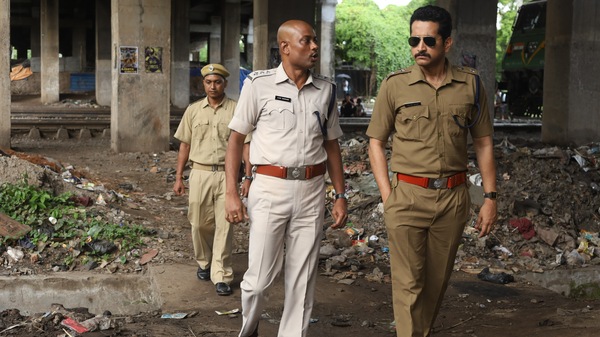Exclusive! Parambrata Chatterjee on Shibpur: There is neither bonhomie nor awkwardness with Swastika due to our equation
The actor talks about his equation with Swastika Mukherjee, with whom he is working in Arindam Bhattacharya’s Shibpur. He also spoke about his Bollywood work and other projects.

Last Updated: 05.58 PM, Aug 14, 2022
Parambrata Chatterjee will be seen as an IPS officer in Arindam Bhattacharya’s political thriller Shibpur. Historically, in the 1980s Shibpur – a locality in Howrah that is a stone's throw away from the heart of Kolkata – used to be infamous for rampant criminal activities. During that period, chief minister Jyoti Basu appointed a strong IPS officer to bring the law and order situation under control. In the film, Swastika Mukherjee will also be seen as one of the lead characters. In an exclusive chat with OTTplay, Parambrata talked about his character, his projects beyond Bengal and his professional equation with his co-actress Swastika, his rumoured ex. Read on…
What made you say yes to the character Sultan Ahmed in the film, Shibpur?
It is wondrous to see that a place so close to Kolkata used to be free reign for antisocial activities and criminal activities. A lot of violence used to happen there and most of it was, as always, controlled by politicians. But Due to all of that a few common people suffered. In the film, one character rose from this suffering and out of vengeance became one of the kingpins of that area. And that person’s interaction with the cop in charge of that area, and the dynamics between them got me excited.

From my father’s side, I am connected to this area. I spent all my childhood holidays in Shibpur. My father’s ancestral house was there. It is not there anymore. We sold it off ages ago. Also, there is a kick of playing two ages in the film. For older age, we have done some prosthetic makeup
How did you prepare for the character?
I drew up a few basic lines for this character. His name is Sultan Ahmed. So my first question is if he is a Bengali Muslim or if he is not a Bengali person at all. There are distinct differences in the way they operate. My director’s answer to that is Sultan is a Bengali Muslim. In my head I mapped the character – he is probably from a district like Burdwan or Birbhum. He is well adept at the ways Bengali Hindus operate as well. That’s why I tried not to make his Muslim identity surface that much because he is very well synchronised. Also, he is in a top position in the department and he is an IPS. He is in charge of a very disturbed area. He knows his job, and how to gel with others. He also has a little bit of human traits. But that is subdued.
It is a political thriller – a slice taken from history. In this time and age, how easy or challenging is it to work in a political thriller?
In today’s time, if you do something or you don’t you get trolled anyway. It doesn’t matter anymore. It doesn’t matter if you are a creator or actor – you will be attacked. Even music directors are not spared these days. There has to be an end to caring about all of that. It is a real story, set in real space and played out in a real frame and that’s what matters.
You will be seen as a lead character in Kannada filmmaker Pawan Wadeyar’s Bollywood debut Notary...
I don’t look at it like that. It is the script that I liked. It is a social film with a very important social message delivered in the garb of a comedy. I thought it was worth exploring. And I am also very glad that I was offered that film. I don’t look at it like, ‘Oh it is a film where I am playing the lead’. In one sense, I am playing the new lead track in some way in Mumbai Diary. For me, every character is a lead character. In Jehanabad also, in terms of screen time, other characters occupy more space. But for me, the character that I play is the lead of that part. That is how I evaluate a project.
Meanwhile, the accolades around Aranyak keep coming. You are nominated as the Best Actor for the series at the Indian Film Festival, Melbourne…
I am just hoping that season two starts. I don’t know and I am not informed properly yet. But I am hoping that it may start sometime next year.
You have started working on a Bengali film on Alipore Conspiracy. What makes you choose such a subject? When will you start shooting?
That idea came to me when we were discussing something about Bangali Asmita – the idea of Bengali nationalism. I think it all started granulating from the historic event of the attempt of the Partition of Bengal in 1905 (Banga Bhanga movement). Right after that, the territory saw militant nationalism in Bengal. It was spearheaded by very important figures, Aurbindo Ghosh being one of them. I find the people who did not exactly align with him in his ways of working did have the same goal – the freedom of the country. People like CR Das were probably slightly different from the ideologies of Aurobindo Ghosh. However, he fought tooth and nail to free Aurobindo from the clutches of the British. These two people are the backbone of my film. The court case that ensued is the backbone of my story. We are planning to start late winter-early spring – maybe February 2023. And through these two characters, we will see the nature of the freedom movement in that era.
You and Swastika have a personal equation. At some point of time in your career, you are rumoured to be dating each other. How does that personal equation pan out in your workplace?
Our dynamics don’t feature at work. We have worked many times after our equation – in Shah Jahan Regency, Black Widow, etc. There is neither extra bonhomie nor any awkwardness with Swastika due to our equation. It is a very professional and courteous dynamic that we share. We inquire about each other’s well-being. I enquire about her daughter, who is now a lady. I think that’s how civil people behave. At my age, I feel some kind of zen from the inside.
Subscribe to our newsletter for top content, delivered fast.
